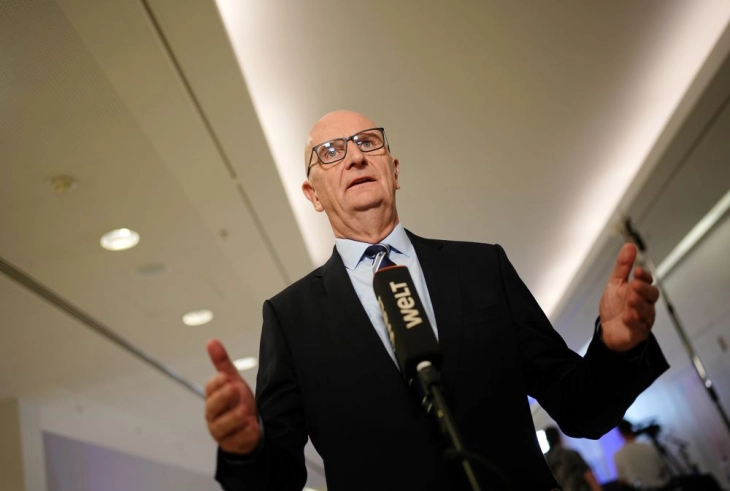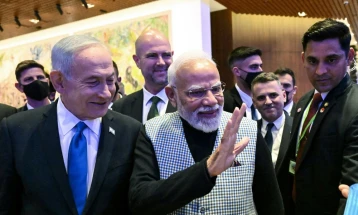Germany dodges a historic second far-right win in a state election
- Germany has avoided having a far-right party as the strongest force in a second state on Sunday, just weeks the anti-migrant Alternative for Germany (AfD) became the first far-right party in post-war history to win an election.

Potsdam, 23 September 2024 (dpa/MIA) - Germany has avoided having a far-right party as the strongest force in a second state on Sunday, just weeks the anti-migrant Alternative for Germany (AfD) became the first far-right party in post-war history to win an election.
The centre-left Social Democrats (SPD) achieved a narrow election victory over the far-right AfD in the eastern German state of Brandenburg, according to preliminary results.
Brandenburg's incumbent SPD premier, Dietmar Woidke, who has led the state for 11 years, claimed another term with 30.9% of the vote, while the AfD came in at 29.2%, according to provisional official results from the state electoral commission.
The SPD has ruled in Brandenburg since 1990, when the first democratic elections were held in the state following the collapse of the communist regime in the former East Germany.
The AfD's 29.2% is a meaningful gain from 2019, when it got 23.5% of the vote. But the AfD had hoped for a first-place finish over the SPD after opinion polls in the weeks before the election showed them in a narrow lead.
The upstart populist Sahra Wagenknecht Alliance (BSW) received 13.5% in the party's first state election in Brandenburg.
The BSW, which launched as a party earlier this year, combines left-wing social policy with a hard-line anti-immigration stance and strenuous opposition to Germany's support for Ukraine.
The centre-right Christian Democrats (CDU) collected 12.1%, a major disappointment after polls suggested the party might gain seats. It is the worst-ever result for the CDU in a state election in the former East Germany.
The Greens, who are currently in Woidke's coalition government in the state, the hard-left Die Linke ("The Left"), and the conservative Free Voters fell below the 5% threshold required to enter parliament.
Voter turnout was 72.9%, the highest ever in state elections in Brandenburg.
Brandenburg's vote and the 2025 federal election
The SPD's showing is also likely to be seen as a boost to embattled German Chancellor Olaf Scholz, a Social Democrat, even though Woidke kept Scholz at arm's length during the campaign. Polls show Scholz's SPD coalition with the Greens and the pro-business Free Democrats in the federal parliament as being deeply unpopular.
Scholz, in New York for a UN summit, called the results "good, of course," but said he would wait until Monday before offering more detailed comments on them.
The news for the conservative CDU isn't great. The Brandenburg election was the first one after Friedrich Merz was named the CDU's chancellor candidate, so the party's poor showing is likely to be seen unfavourably for the man who hopes to unseat Scholz next year.
Gamble pays off for SPD's Woidke
Woidke, an affable 62-year-old agricultural engineer, campaigned hard against the AfD while also seeking to distance himself from Scholz, who is mired with miserable approval ratings.
SPD co-chairman Lars Klingbeil on Sunday endorsed Scholz as candidate for chancellor in 2025 in view of the Brandenburg result.
Woidke had put his neck on the line by insisting that, if the SPD does not place first in the election, he would step down and no longer lead the Brandenburg government as state premier.
Opinion polls in the weeks ahead of the election showing the SPD trailing the AfD by as much as 6 percentage points improved just before the vote, with the SPD making up ground.
Woidke on Sunday evening said the AfD's apparent gains were a cause for alarm and reflection regardless of the eventual results.
"When a party which is in part openly right-wing extremist succeeds here in Brandenburg with almost 30%, then that must give us reason to reflect," said Woidke at the SPD election party in Potsdam.
The CDU's top candidate, meanwhile, called Sunday a "bitter evening" for the party as they fell "far below our expectations."
The CDU's Jan Redmann said he believes opinion polls showing the AfD in first place may have scared voters and pushed them to vote strategically for the SPD.
Photo: MIA







